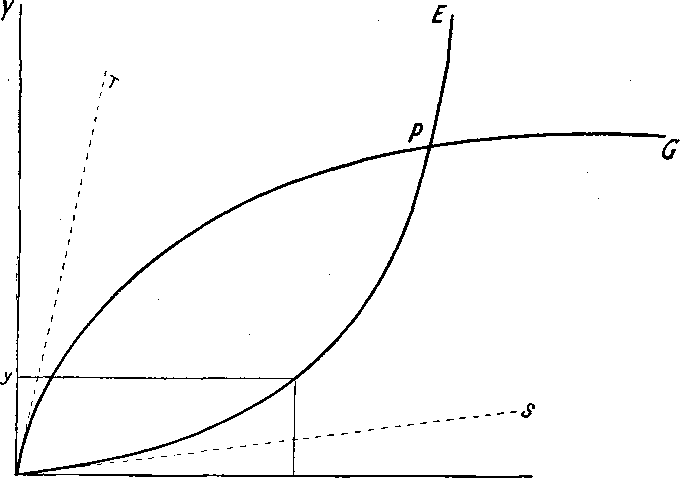THEORY OF INTERNATIONAL VALUES
623
and combination should, I think, be sparingly applied to inter-
national trade.1
■ The introduction of the idea of monopoly adds difficulty to a
passage in the chapter on the ‘ Theory of International Values,’
which in the absence of2 mathematical representation I am
unable to interpret with confidence. The writer appears to sup-
pose that the part played by utility would be different if, to use
Mill’s familiar example, the comparative cost of production in
England were not 10 of cloth to 15 of linen, but 10 of cloth
to less than 10; β.g., 1 of linen. I cannot regard this distinction
as essential. In both cases the curve of indifference is represented
by a straight line, the costs of production being supposed constant.
Thus OT in the figure, the tangent of TOX being 2, represents
those states of trade in which Germany would be no better off
than if there had been no foreign trade ; the cost of producing
linen comparatively with' that of producing cloth in Germany

O X X
Fig. 6.
1 Tha use of the term monopoly in a sense not involving the attribute indeter-
minateness is allowable (e.g. International Trade, p. 115, note. Cf. ante, p. 43, par.
1). It is tenable, too, that transactions between two countries, though determinate,
■are less steady than where these are competing nations.
2 p. 37.
More intriguing information
1. The Shepherd Sinfonia2. Detecting Multiple Breaks in Financial Market Volatility Dynamics
3. Determinants of Household Health Expenditure: Case of Urban Orissa
4. The Determinants of Individual Trade Policy Preferences: International Survey Evidence
5. The name is absent
6. The name is absent
7. Tourism in Rural Areas and Regional Development Planning
8. The name is absent
9. Insurance within the firm
10. GOVERNANÇA E MECANISMOS DE CONTROLE SOCIAL EM REDES ORGANIZACIONAIS